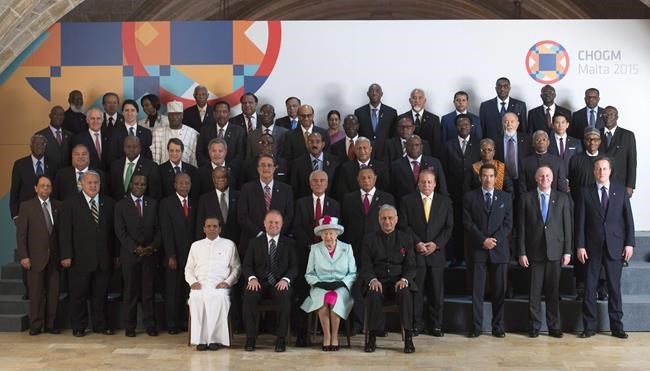
Queen Elizabeth poses with leaders for a family photo at the Commonwealths Heads of Government meeting, Friday Nov. 27, 2015 in Valletta, Malta. THE CANADIAN PRESS/Adrian Wyld
Republished September 09, 2022 - 3:26 PM
Original Publication Date September 09, 2022 - 11:01 AM
Some Canadians from diaspora communities called for the country's independence from the Crown on Friday, saying the death of the Queen is a chance to rethink its ties to the monarchy.
More than 50 countries with historical links to Britain are part of the Commonwealth, which Queen Elizabeth II was head of throughout her reign. Her death Thursday came as a growing number of nations debate their relationship with the British Crown amid demands that the country apologize for its colonial-era abuses and award its former colonies slavery reparations.
Parmod Chhabra, the president of the India Canada Association, said he respected the Queen as the sovereign of Canada but thinks it's time for the country to break ties with the Crown.
“I think it is the time for the monarchy to go away,” said Chhabra, recalling atrocities committed against Indians when the British Empire ruled that country.
“We should start rethinking about it, and think about total freedom, instead of having the Queen as our head whom we don’t elect," he added.
That sentiment was shared by Monir Hossain, the president of the National Bangladeshi-Canadian Council, who said Canada should be a fully independent nation like other countries around the world.
“I think we all want independence these days," he said. "The world is moving forward.”
The Royal Family has faced multiple controversies this year surrounding the Crown's continuing role in Britain's former colonies as members travelled to celebrate the Queen's Platinum Jubilee, which marked her 70 years on the throne.
In March, Prince William and the Duchess of Cambridge were sharply criticized for being "tone deaf" and perpetuating images of Britain's colonial rule during a tour of Belize, Jamaica and the Bahamas.
Though many people welcomed the royals, they were also greeted by protesters demanding an apology for Britain's role in the enslavement of millions of Africans and reparations for the damage caused by slavery.
The following month, the Earl and Countess of Wessex -- Edward, the youngest son of the Queen, and his wife Sophie -- postponed the Grenada leg of a Caribbean tour on the eve of the seven-day trip after consultations with the Grenadine government and the governor general, the Queen's representative on the island.
They had been likely to face similar calls for a British apology during their planned visit to Grenada, where activists had requested an audience with the royal couple.
Barbados cut ties to the monarchy in November and Jamaica has said it will follow suit.
In Canada, the Queen’s death will likely fuel conversations about getting rid of the monarchy, as well as responses that the country's system works well and would be too hard to change, said Jonathan Malloy, a political science professor at Carleton University.
“The Queen’s longevity has allowed us to perhaps put off some conversations,” and some will see her passing as an opportunity for change, he said Friday.
The monarchy is anachronistic and represents values that no longer align with Canada’s direction, but the system “does actually work fairly well … and it would be extremely hard to change,” he said.
For instance, the Crown is at the heart of our legal and political systems, and cutting ties with it would, among other things, undermine treaties with Indigenous nations, he said.
Provinces probably also like the current system because it allows them to claim their own direct relationship with the Crown, and changing that would require them to overhaul their systems, Malloy said.
There would also be issues related to how to select a new head of state, and the risk that removing the Crown would open the door to other attempts to change the Constitution, he said.
“No government wants to be consumed by constitutional talks and changes,” he said, pointing to the constitutional crises of Meech Lake and Charlottetown several decades ago.
Not everyone in the diaspora community criticized the Queen and the British monarchy on Friday.
Reuben Wong, 73, who grew up in poverty in Hong Kong before immigrating to Canada in the 1970s, said he wouldn’t be where he is today without the Queen and the British system.
Hong Kong has not been a part of the Commonwealth since the 1997 handover to China, but some in its diaspora in Canada continue to embrace the monarchy.
“The Queen’s spirit lives in my blood,” the Richmond, B.C., retiree said Friday.
Wong said he grew up in a village with no water or electricity, and paid tribute to the free education provided by colonial British authorities that allowed him to immigrate and forge a career as a public servant.
“When I look back, I feel thankful to the British system in Hong Kong and the Queen," he added.
- With files from Paola Loriggio, Nono Shen and The Associated Press
This report by The Canadian Press was first published Sept. 9, 2022.
News from © The Canadian Press, 2022